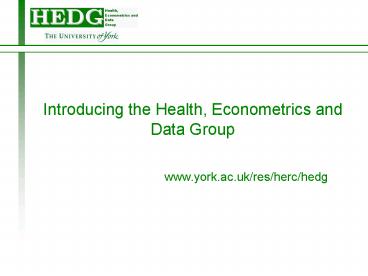Introducing the Health, Econometrics and Data Group - PowerPoint PPT Presentation
1 / 15
Title:
Introducing the Health, Econometrics and Data Group
Description:
ngel L pez Nicol s. Tinbergen Institute, the Netherlands. Maarten Lindeboom ... ngel L pez Nicol s. Owen O'Donnell. Miaw-Chwen Lee. Fabrice Etil . Partha Deb ... – PowerPoint PPT presentation
Number of Views:183
Avg rating:3.0/5.0
Title: Introducing the Health, Econometrics and Data Group
1
Introducing the Health, Econometrics and Data
Group
www.york.ac.uk/res/herc/hedg
2
Who we are
At its core, HEDG is comprised of Nigel, Andrew
Jones and a bunch of PhD students.
HEDG is comprised of internal, external and PhD
affiliates, who participate in collaborative
research as well as the HEDG seminar and working
paper series.
3
Who we are
Nigel Rice - Director Andrew Jones - Research
Director
Affiliated PhD Students
4
Who we are
Internal Affiliates
5
Who we are
External Affiliates
6
Where we are
Andrew Jones Luigi Siciliani Silvia
Balia Cristina Hernández Quevedo Anderson Eduardo
Stanciole Lynn Gambin Dolores Jiménez Rubio
Internal
Matthew Bending
Nigel Rice Richard Cookson Hugh Gravelle Rowena
Jacobs Giorgia Marini Andrew Street Adriana
Castelli Mark Dusheiko Arne Risa Hole Andrea
Manca Pedro Rosa Dias Casey Quinn Rodrigo Moreno
Serra Edit Velenyi Teresa Bago d'Uva Silvana
Robone Peter Sivey Sandra Sosa-Rubi Eugenio
Zucchelli
7
Where we are
Hans Olav Melberg Anne Line Bretteville-Jensen
John Wildman
External
Fabrice Etilé
Miaw-Chwen Lee
Partha Deb
Ángel López Nicolás
Owen ODonnell
Eddy Van Doorslaer Stéphanie van der Geest Xander
Koolman Maarten Lindeboom Francesco
Paolucci Marco Varkevisser Wynand van de Ven
8
What we do
- Applied Microeconometrics in health and health
care - longitudinal analysis of panel data (BHPS, ECHP,
WHS, etc) - inequalities in health and health care
- effect of income on retirement and health
- NHS labour-market forces factor
- impact of health on labour market outcomes
- responsiveness of health systems
Nigel
- Applied Microeconometrics in health and health
care - longitudinal analysis of panel data (BHPS, ECHP,
WHS, etc) - inequalities in health and health care
- impact of health on economic behaviour
- health care utilitisation and provision
Andrew
9
What we do
- Applied microeconometrics and health economics
- socioeconomic inequality in health care
utilisation in Europe - reporting heterogeneity bias and health
inequality measurement - latent class models for utilisation of primary
care
Teresa
- Impact assessment of health programmes using
experimental and non-experimental data (analysing
Brazils Programa Saude da Familia (Family
Health Programme) - economic evaluation of health care programmes
and treatments - social choice in the health sector
Rodrigo
- copulas and measures of dependence and
distribution - lifestyles, health and mortality
- cost-effectiveness analysis and economic
evaluation - horizontal health inequity
Casey
10
What we do
- dynamic and static micro-simulation of health
economies (health inequality and mobility) - distributional impact(s) of policy change(s) in
developed countries - poverty and inequality measurement
Eugenio
Silvana
- geographical inequalities in health and health
care - (geographical) patients mobility and mortality
- applied industrial theory in the health care
industry
Pedro
- alternative conceptualisation of inequality
- measuring inequality of opportunity in health
- applying stochastic dominance techniques to
inequality measurement
11
What we do
- Measurement of socioeconomic inequalities in
health in the European Union - Reporting bias in ordered models of
self-assessed health - Dynamic Panel Data models for morbidity in the
European Union
Cristina
- Discrete-choice models
- duration analysis
- Inequalities in health
- mortality, expected longevity, health and
lifestyle
Silvia
12
What we do
HEDG seminar series
- The HEDG seminar series is an important
collaborative link between individuals interested
in quantitative aspects of health economics at
York, and visitors from the national and
international research community. Particularly
for - linking complementary research ideas and skills
- presentation and discussion of preliminary work,
including work by PhD students, in an informal
environment - active dissemination of recent research
- providing peer review of draft papers and
research proposals - providing a focal point for contacts with
similar research groups or individuals in the
wider research community.
13
What we do
HEDG working paper series
WP 06/03 Does reporting heterogeneity bias the
measurement of health disparities? WP 06/02
Solidarity in competitive markets for
supplementary health insurance an empirical
analysis WP 06/01 Why do patients bypass the
nearest hospital? An empirical analysis for
orthopaedics care and neurosurgery in the
Netherlands WP 05/14 Health shocks, employment
and income in the Spanish labour market WP 05/13
Generalisable regression methods for
cost-effectiveness using copulasWP 05/12
Socioeconomic inequalities in health a
comparative longitudinal analysis using the
European Community Household PanelWP 05/11 Does
onset or quality of prenatal care matter more for
infant health?WP 05/10 The labour supply of
nurses in the UK evidence from the British
Household Panel Survey.
14
Coming up
The Marie Curie Training Programme in Applied
Health Economics
http//www.york.ac.uk/res/herc/APPHEC
- The aims of the Marie Curie Training Programme in
Applied Health Economics are - to introduce young professional to the main
techniques used in applied health economics - to provide practical experience with the
application of such techniques - to instil a code of good practice in the
analysis of health data that will permeate the
profession
15
Coming up
Public services international comparison of
responsiveness using anchoring vignettes
- Using the WHOs World Health Survey, Nigel (and
Peter Smith) will examine - its suitability for cross-national comparison of
health system performance - the use of self-reported measures of health
system responsiveness as an appropriate measure
of health system performance - the use of anchoring vignettes to control for
differential and systematic reporting of health
system responsiveness - socio-economic and demographic determinants of
health system responsiveness - drivers of reporting heterogeneity in
cross-national comparative research on health
system performance































